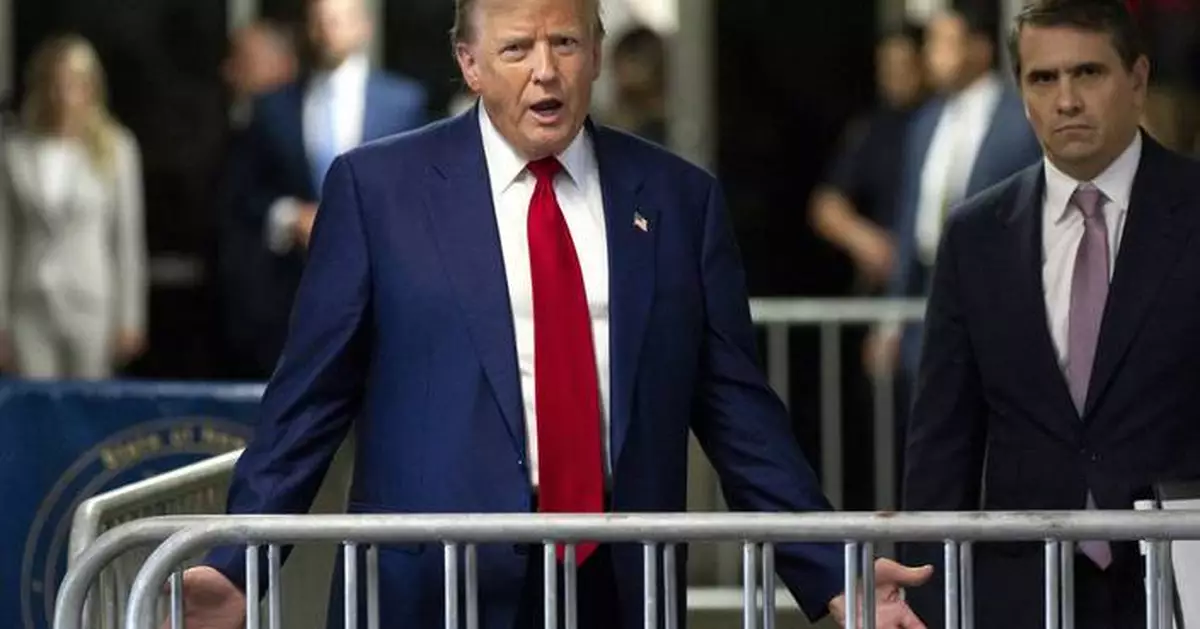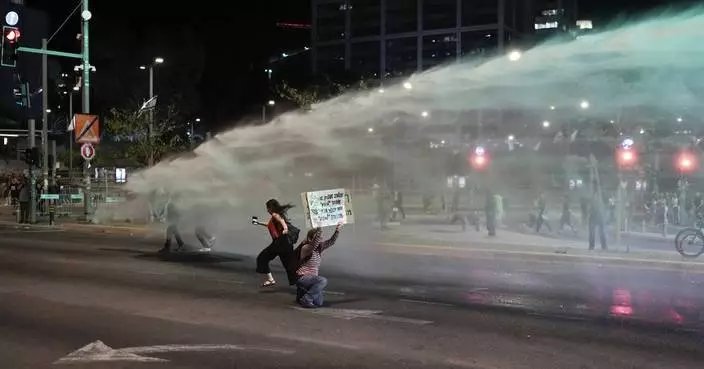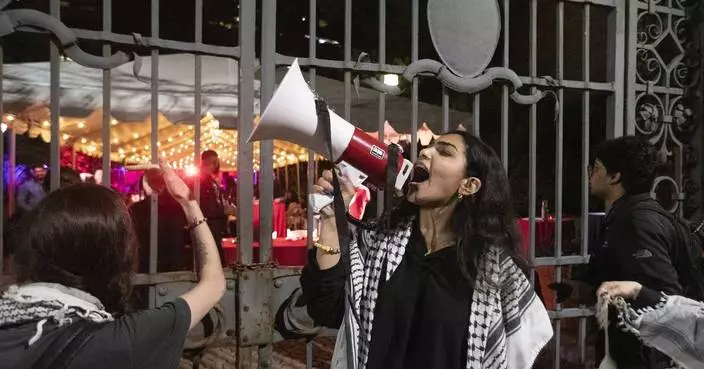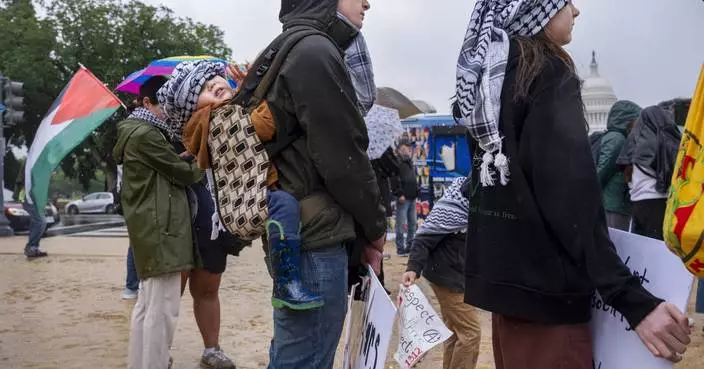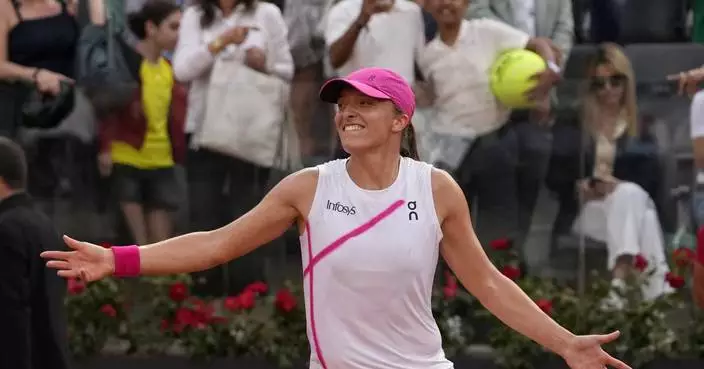NEW YORK (AP) — Virtually every day of his hush money criminal trial, former President Donald Trump talks about how he can’t talk about the case.
A gag order bars Trump from commenting publicly on witnesses, jurors and some others connected to the matter. The New York judge already has found that Trump, the presumptive Republican nominee for president, repeatedly violated the order, fined him $9,000 and warning that jail could follow if he doesn't comply.
But the order doesn't stop Trump from talking about the allegations against him or commenting on the judge or the elected top prosecutor. And despite a recent Trump remark, it doesn't stop him from testifying in court if he chooses.
As he fights the felony charges against him while running for president, Trump has at times stirred confusion about what he can and can't do in the case. He has pleaded not guilty.
So what does the order do, what doesn't it and where did it come from?
Generally speaking, a gag order is a judge's directive prohibiting someone or people involved in a court case from publicly commenting about some or all aspects of it. In Trump’s case, it’s titled an “Order Restricting Extrajudicial Statements,” with “extrajudicial” meaning outside of court.
Gag orders, particularly in high-profile cases, are intended to prevent information presented outside a courtroom from affecting what happens inside.
Trump also is subject to a gag order in his federal criminal election interference case in Washington. That order limits what he can say about witnesses, lawyers in the case and court staff, though an appeals court freed him to speak about special counsel Jack Smith, who brought the case.
In his recent New York civil fraud trial, Trump was fined a total of $15,000 for comments he made about that judge’s law clerk after a gag order barred participants in the trial from “posting, emailing or speaking publicly” about the court's staff.
The U.S. Supreme Court has acknowledged that gag orders can pit fair trial rights against free speech rights. The court has struck down some orders that barred the press from reporting on certain cases or court proceedings and rejected as too vague a Nevada court rule that limited what all lawyers could say out of court.
Yes. Before the trial, he asked a state appeals court to postpone the trial while he appeals the gag order, but the court refused. His appeal of the order itself is ongoing.
Initially imposed March 26, the gag order bars Trump from making or directing others to make public statements about any juror and about any “reasonably foreseeable" witness' participation in the investigation or the trial.
It also bars any statements about lawyers in the case, court staffers, prosecution aides and relatives of all of the above, to the extent that the statements are intended to “materially interfere with, or to cause others to materially interfere with” their work on the case “or with the knowledge that such interference is likely to result.”
The order doesn’t apply to Judge Juan M. Merchan or to Manhattan District Attorney Alvin Bragg, whose office is bringing the case. It does apply to comments about their family members, however. Merchan added that provision on April 1 after Trump lashed out on social media at the judge’s daughter, a Democratic political consultant, and made a claim about her that was later repudiated by court officials.
Trump is also allowed to talk about his political opponents, as Merchan made clear on Thursday.
The order also doesn't bar witnesses from commenting on Trump. Michael Cohen, Trump's ex-lawyer and an expected witness, has routinely attacked his former boss, leading Trump to complain about not being able to respond in kind.
Yes. The U.S. Supreme Court has held that criminal defendants have a constitutional right to take the stand in their own defense — or not to.
There was some confusion after Trump said Thursday that because of the gag order, he was “not allowed to testify.” In context, it appeared he was actually referring to his ability to respond to a reporter's court-hallway question about a witness' testimony that afternoon.
Trump clarified to reporters Friday that he understood the order wasn't a bar on testifying. Merchan emphasized the same in court.
“I want to stress, Mr. Trump, you have an absolute right to testify at trial, if that’s what you decide to do after consultation with your attorneys,” Merchan said.
Merchan found that Trump violated the gag order with social media posts that laid into Cohen. Among the offending posts: one that asked whether “disgraced attorney and felon Michael Cohen been prosecuted for LYING," a repost of a New York Post article that described Cohen as a “serial perjurer,” and a Trump post referring to Fox News host Jesse Watters’ claim that liberal activists were lying to infiltrate the jury.
Merchan noted that Trump's comment on the Watters segment misstated what the host had actually said, making the comment “the words of Defendant himself.”
On the other hand, Merchan declined to sanction Trump for an April 10 post that referred to Cohen and Stormy Daniels, the porn performer who got a $130,000 hush money payment that's at the heart of the case, as “sleaze bags.”
Trump contended that he was responding to previous comments by Cohen, and the judge said the back-and-forth gave him pause as to whether that post met the bar for a violation.
When Merchan fined Trump $1,000 apiece for nine violations — the maximum fine allowed by law — he wrote that “jail may be a necessary punishment” for some wealthy defendants who won't be deterred by such a sum.
Merchan added that he “will not tolerate continued willful violations” of the gag order and that, if “necessary and appropriate,” he “will impose an incarceratory punishment,” meaning jail.
It's unclear what would rise to the level of “necessary and appropriate."
Defense lawyer Todd Blanche indicated in court Friday that he plans to appeal the judge’s finding this past week that Trump violated the gag order.
Prosecutors have asked Merchan to hold Trump in contempt again and fine him $1,000 for each of four alleged violations from April 22-25. But the prosecution isn't asking for the former president to be locked up over those comments because they happened before Merchan's jail warning and because “we’d prefer to minimize disruption to this proceeding," prosecutor Christopher Conroy said.

Former President Donald Trump speaks to media as he returns to his trial at the Manhattan Criminal Court, Friday, May 3, 2024, in New York. (Charly Triballeau/Pool Photo via AP)

Former President Donald Trump speaks to media as he returns to his trial at the Manhattan Criminal Court, Friday, May 3, 2024, in New York. (Curtis Means/Pool Photo via AP)

Former President Donald Trump returns to the courtroom following a break in his trial at Manhattan criminal court in New York, on Friday, May 3, 2024. (Charly Triballeau/Pool Photo via AP)

FILE - Former President Donald Trump speaks outside the courtroom in New York, April 30, 2024. A gag order bars him from making public comments on witnesses, jurors and some others connected to the case. The judge found that Trump repeatedly violated the order and he fined Trump $9,000 and warned that jail could follow if Trump keeps it up. The order doesn't stop Trump from talking about the allegations against him or commenting on the judge or the elected top prosecutor. And it doesn't stop him from testifying in court if he chooses. (Justin Lane/Pool Photo via AP, File)


